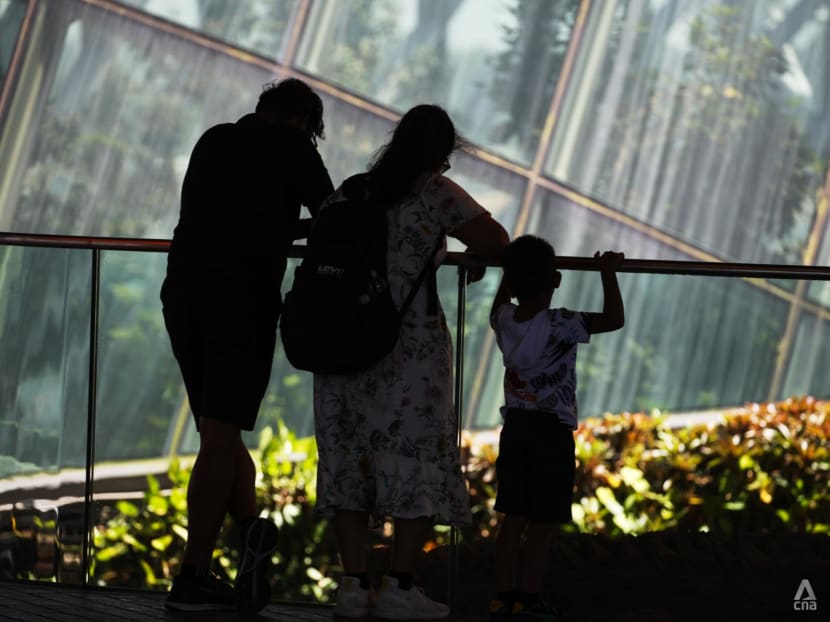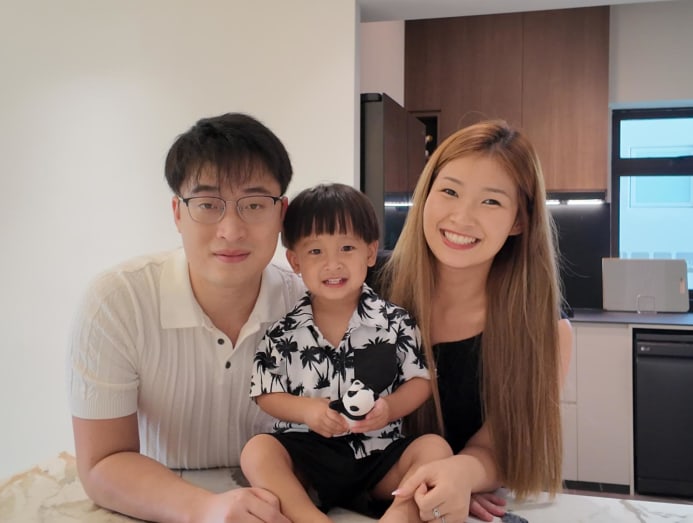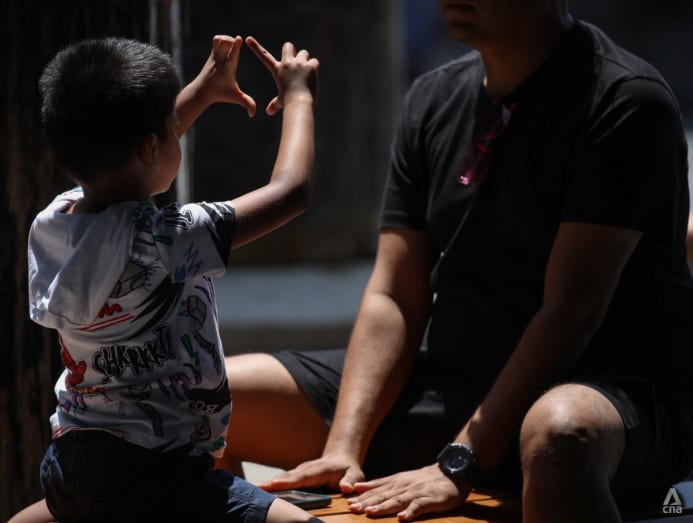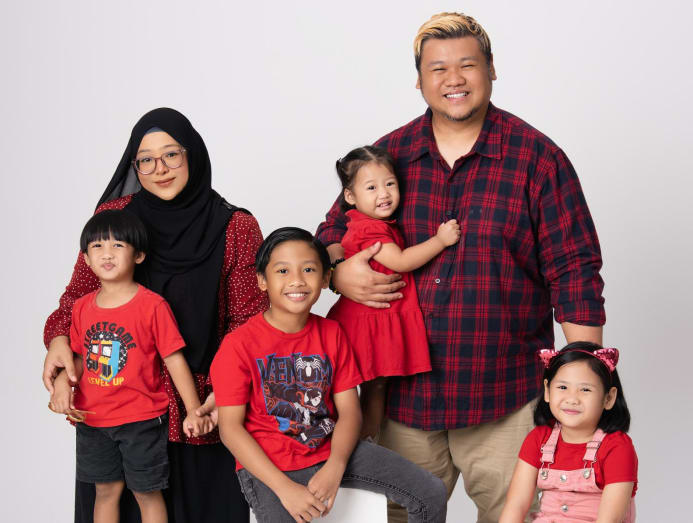'Everyone thinks they're experts': How advice overload is fuelling parents' self-doubt
There are debates over sleep-training, infant milk, screen time and discipline styles, with an overwhelming amount of research and opinions out there on the "best way" to raise a child. Parents end up feeling frustrated when navigating this minefield of advice.

More parents today feel pulled in different directions when deciding how to raise their child. (Photo: CNA/Nuria Ling)

This audio is generated by an AI tool.
When Mr Roystonn Loh first became a parent eight years ago, he recalled facing a “pretty overwhelming” amount of advice from relatives and online sources preaching the best way to raise a child.
These run the gamut of whether or not to embark on sleep training, what to do when a child falls ill and when is the right time to teach the child to read or swim.
The 35-year-old business owner and father to three children aged eight, seven and three said: “Being a first-time parent then, we weren’t entirely sure of what the best practices were for raising a child.
“There was, of course, plenty of unsolicited advice from aunts, uncles and in-laws, but we mostly picked and chose the ones we thought were the most logical, and 'trial-and-error' our way through the first and second child.”
When his youngest child came along, Mr Loh and his wife realised that it was better to rely on their own instincts and childhood experiences rather than to struggle in trying to keep up with the barrage of parenting information out there.
“We’d try to replicate positive experiences that we enjoyed about our childhood and avoid things that gave us a hard time as children emotionally,” Mr Loh said.
Likewise, another 41-year-old parent, who wanted to be known as just Alicia, said that she found herself confronted by “too much information” when she first became a parent. A therapist, she is now a mother of an 18-month-old child.
Initially, she turned to books and took advice from like-minded friends around her, as well as from online forum Reddit and other mum groups.
However, she found herself facing an avalanche of advice. “Everyone with a child, and especially those with more children, seem to think they are experts in raising children.
“Google can also provide justification for any decision you choose to make – whether you are pro-sleep training or anti-sleep training, for co-sleeping or not, or (the choice of) formula milk.”
Given the growing amount of literature on various parenting practices and styles, parents interviewed by CNA TODAY said that they felt pulled in different directions when deciding how to raise their child.
This could mean being plugged in to a debate between "gentle" parenting as opposed to a more punitive-focused one, or having a nuanced understanding of the pros and cons of attachment parenting versus the secure-attachment style.
For some, navigating this minefield of information has become part of the initiation process of being a first-time parent.
The end result is that parents sometimes find themselves at odds with others over certain practices such as sleep training, screen time and baby-led weaning, and these conflicts can occur between partners, within families or among friends.

EVOLUTION OF PARENTING APPROACHES
Advances in understanding the well-being and development of children over the years have had positive outcomes on modern parenting. The downside, parents said, is that having too much access to such information can be “extremely conflicting and overwhelming”.
Ms Eunice Louisa Iswahyudi, a 21-year-old stay-at-home mother and content creator, said: “For example, with sleep training, I read conflicting arguments. Some say it’s essential for better sleep quality, while others claim it can harm a child’s emotional well-being."
Sleep training is letting a baby learn to fall asleep without help from the parents.
“There’s no one-size-fits-all answer and it can be confusing when experts, other parents and even family members have strong opinions in different directions,” she added.
Differing views on parenting practices have always existed, experts said. What is different today is that these comparisons are often amplified online, which place pressure on parents.
Dr Sharon Sung, assistant professor at Duke-NUS Medical School and supervising clinical psychologist at KK Women’s and Children’s Hospital, said: “Unfortunately, our interconnected world can also lead us to feel isolated and judged as parents if we aren’t keeping up with what we see online or in other families.
“It can be very difficult for new parents to navigate the different trends and to determine what is the best fit for them and their family.”

Mr Soh Wei Jie, a clinical psychologist at Annabelle Psychology and Annabelle Kids, said that the challenge modern parents face is in sifting through the available content, whether on social media or on official parenting and family guidance sites online, to decide what works best for their families.
That aside, child psychologists told CNA TODAY that these modern parenting approaches show how styles and preferences have shifted away from authoritarian and punitive-focused parenting styles.
Instead, gentler methods that prioritise acknowledging and validating a child’s emotions are becoming more popular among younger parents.
Mr Soh said that parents’ inclination to harsher forms of discipline methods – such as caning – have decreased over the years and that more parents today are instead increasingly open to taking reward- and strength-based approaches to get their children to exhibit expected behaviours.
Ms June Fong, senior forensic psychologist from Promises Healthcare clinic, said that she has observed most parents today opting for a parenting approach that favours emotional connection, talking through problems and using empathic reasoning to get through to their children.
“Regardless of the specific approach – gentle parenting, respectful parenting, positive parenting – all of these emphasise a common denominator: That of recognising and validating a child’s feelings with empathy, before correcting or implementing consequences to problem situations.”
Ms Fong said that the shift could be the result of the current generation of parents responding to their own experiences: “Perhaps it is a reflection of how we were raised – not wanting to subject our children to the same harsh corporal punishments we experienced.”
To this, Ms Erma Othman a parent of four children aged from three to nine, said that she tried to be a different type of parent because of her own experiences.
“It is important for me to ensure that I break the cycle from whatever childhood trauma I had, because my kids are living in a different generation from mine.”
COMING INTO CONFLICT WITH OTHER PARENTS
With there being so many different viewpoints that may or may not be backed by research and personal experiences, parents and experts interviewed by CNA TODAY said that conflict with relatives and fellow parents is inevitable.
On one hand, Mr Soh the psychologist said that because of the sheer amount of information out there, parents might already be feeling some emotional and psychological strain.
That stress is likely magnified by the discrepancy between what is portrayed on social media and the expectations of the older generation, he added.
At the heart of many of such conflicts is the idea that some parents believed what had worked for their children would also work for other families, regardless of the environment and context.
Citing an example of teaching his children about road safety, Mr Loh the father of three children said that he does not hold on to his children’s hands when crossing the road, but that idea has rubbed some people the wrong way.
“The intent is simple: I simply want the children to develop the habit of being conscious of their surroundings without having to be prompted each time.”
He used this way to inculcate the idea of road safety when his children are around four or five years old. There are safeguards, of course, since he or his wife would be close to their children in such situations.
“I would then repeat the actions of crossing the zebra crossing or traffic lights and observe if the children would look out for cars or other dangers. When they don’t, we repeat the process of crossing the same road until they remember to check,” he added.
They felt that this is an effective method to instil good road safety practices in his children, but onlookers would berate them for letting the children cross the road unaided.
“They would speak out, some even yelling out loud, ‘Hey, hold their hands!’ Others would approach us after crossing the roads to point out specifically that you must hold their hands and that it’s irresponsible not to do so.”
Initially, he would explain his reasons for his parenting method, but stopped doing so when he realised that it only led to further arguments.
“It annoyed me immensely initially to be made to feel like I was irresponsible as a parent. After that though, we simply ignored any unwanted comments,” Mr Loh said.
Another parent, 42-year-old stay-at-home mum Regine Tan, said that although her parents and in-laws were not accustomed to the idea of baby-led weaning, she found that it personally worked very well for her second child.
Baby-led weaning refers to a feeding approach where babies skip purees and spoon-feeding, going straight to begin eating solid foods by self-feeding.
Supporters of the practice said that it can encourage babies’ self-regulation, improve their motor skills and foster a positive relationship with food by allowing the child to explore different food at their own pace.
However, naysayers raise concerns about choking risks, messy mealtimes and the challenge of ensuring the child consumes enough food for proper growth and development.
Ms Tan the stay-at-home mum who has two children aged eight and two said that she and her husband had fed their firstborn because they did not have any experience then and relied instead on the advice of their parents.
However, they decided to try something different with their second child, which prompted them to adopt the baby-led weaning approach. The couple found that this worked much better for their child and that her daughter was more willing to eat and try new food as a result.
It is also not uncommon for spouses and friends to come into conflict over parental styles, some said.
Alicia the mother of an 18-month-old said: “To be honest, my partner and I quarrelled a lot about sleeping (practices for our child) initially. I was very influenced by ‘best practices’ ... cannot use pacifiers, cannot co-sleep, don’t set (your child) up for ‘failures’ by having too many sleep aids.
“My partner doesn’t like to read all these and just went with his gut. I eventually gave in and stopped over-analysing things and then, things just fell into a natural pattern.”
She added that they have found that co-sleeping with their child has worked “very well” for them, despite advice from a well-meaning friend to sleep-train their child.
As for the issue of screen time for children, Ms Erma said that it is a divisive topic among parents.
Last month, the government announced that guidelines on screen use would be introduced in schools, including preschools, as part of a new national strategy to address children’s health.
However, she found that allowing her children some amount of screen time worked well and helped her manage her four children, so long as there are sufficient restrictions put in place.
“Screen time and independent sleeping are always constantly discussed among parents," she added.
“Being a preschool teacher and a mother of four with no helper often leaves me being overstimulated and … sometimes, I just want to have some quiet time during meals or to do my chores like cooking and laundry in peace, so that’s the time where screen time is given to my kids.
“However, I do believe in setting boundaries so my kids have to abide by some limits on time and websites being browsed.”

CUTTING THROUGH THE NOISE
Ultimately, experts believe that parents must learn how to cut through the noise in order to avoid being overwhelmed by the wealth of parenting information available. Otherwise, parents could end up feeling pressured, guilty or inadequate about the choices they make.
Ms Fong from Promises Healthcare said: “The guilt probably stems from trying to match some invisible standard of what being a ‘good parent’ means. It’s also complicated by the multitude of conflicting messages from one’s family of origin, relatives, friends and the online community.
“I remind them that no matter what choices they make as a parent, they are likely to be picked on by one camp or another.
"What matters most is what works for their child. That’s the outcome they should be focused on, not the ‘noise’ that surrounds them.”
The experts who spoke to CNA TODAY suggested that parents should establish their key values and what they would like to teach their children.
After establishing this as a baseline, parents would do well to ensure that they also align with their partner on parenting beliefs, because consistency in parenting is vital and has bearings on how children respond.
Parents with multiple children also have to tailor their methods for each child, since they all have different temperaments and personalities.
Dr Vivien Yang, principal psychologist at Bloom Child Psychology, a private practice, said: “Parenting is not one-size-fits-all. No one knows your child better than you, not even a professional.”
And instead of sticking to one parenting method, the experts suggested general approaches that parents should adopt.
As a guide, prioritising parent-child emotional connection – or “connection before correction” – will form a good foundation on which other parenting practices would be built, Dr Yang said.
Having a reasonable level of structure in terms of discipline, expectations and boundaries-setting for the child is also crucial, she added.
Part of the fear that modern parents have stems from the amount of articles and research showing how parenting missteps can end up hurting the child’s future, the experts explained.
Ms Fong said: “Parents who worry about ‘getting it wrong’ have good intentions at heart but may see parenting as a high-stakes challenge. They are very cautious and wary of making any missteps that may mess up their child.
“However, this can breed an air of overprotectiveness and intolerance for mistakes, which can ironically create more anxiety for their child. Because the message that one is sending is that ‘I cannot afford to make the wrong decision’ and ‘if we don’t get this right, it is the end of the world’."
Such catastrophic thinking is neither healthy nor productive for the parent and child, she added.
Instead, she advocated the concept of a ‘good enough’ parent, in which parents are allowed space to make mistakes. In so doing, they serve as a role model for their child and teach them how to take responsibility and make corrections when things go wrong.
In the end, these parenting choices often do not have a significant impact on the child's long-term development on their own, Dr Yang said.
Many other factors, including peer influence, also have an impact on children's upbringing.
What all of this means is that the evidence-based parenting research that is out there serve as just a broad guideline for parents and not for them to adopt these approaches wholesale.
The experts stressed repeatedly that parenting has to be tailored to their individual child’s needs and temperaments, instead of regarding it as the be-all-and-end-all or as a singular “best way” to parent.
Echoing this sentiment are the parents interviewed by CNA TODAY, several of whom realised later on that they should trust their own instincts.
Mr Loh the father of three young children said that it was after he shed his status as a first-time dad that he realised the advice he hears from others are often well-intentioned, but lacked specificity to his own kids.
Instead, such “advice” are really just life experiences that were borne out from people’s own individual experiences when they were new parents. It does not apply to all contexts, he concluded.
“Contradictions (in parenting methods) were commonplace and in the end, all we felt we could truly trust were our own experiences,” he added.
What his experience from raising his two older children taught him was that he was never going to be a “perfect parent” – and that was okay.
"We simply did what we knew best for the best interests of our children, at that point in time.”














